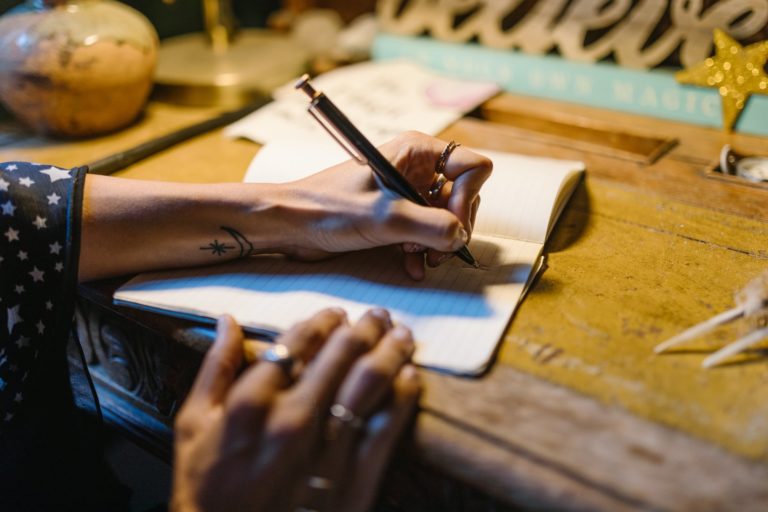11 Strategies for Blocked Writing
I’ve always scoffed at books or blogs or workshops that addressed the dreaded WBS. But then, to my total embarrassment, I got stuck. Mired in a very real, very block-headed slump which I refuse to call by its full, cliché name, like He-Who-Shall-Not-Be Named. I won’t even refer to it directly as the title of this blog.
So there I was, about three quarters through a novel so marketable that an agent chased me down after a conference first-page critique and asked for the entire book. Seriously. The other attendees at my table literally (and I use the word “literal” very sparingly) stared with slack-jawed envy. Yet I had just begun writing the novel and wasn’t even ready to query. A year later, at another conference, more query critique sessions yielded the same interest. Thus, I knew my idea was solid and my first pages strong. And yet… I couldn’t write the end!
Okay, I promised some tips for getting out of WBS, not a story about me. So first, let’s try to identify what kind of block you’re experiencing. Are you:

Stuck on a minor detail, like solving a problem or plot loophole? Time for a “Say Yes Night.*” Every time you hear yourself saying, “I couldn’t possibly change that part,” you should immediately try changing it (just in a draft format). It will expand your work, no matter how much you keep. And yes you can modify things if need be—you’re the master creator! Or, less excitingly, see if you can modify a different variable in your novel that isn’t crucial, which might enable an easier scenario to present itself to you. Also, try bouncing ideas off friends, especially the ones who are not writers. They’re not attached to outcomes like you are. The idea here is to stay open!
Stuck for the next plot point because you don’t know how it ends, and pantsing is no longer working? It might be time to outline—sorry! I feel you! I’m a pantser, too. This is a boring suggestion on my part, but the writing teacher knows sometimes ya gotta just suck it up.
Stuck because the characters and story went rogue, and you don’t know what they want next? Harder. Hmm. Try asking each character what they want to happen next, and what they really don’t, and then make at least some of those undesired things happen to shake things up. Either way, you’ll learn more about their motivations.
Stuck because you’re trying to make a character do or be something they’re not? This will also require either a restructuring of their persona or some intensive journaling for backstory.
Stuck with where to even start writing your new novel? If you’re trying to open a story you know you want to write, or have a character you see clearly but for whom you lack a clear plotline, then I’d let go of the idea of ‘starting at the beginning.’ Just dive in anywhere that feels exciting and the rest will follow. Writing is not always the Yellow Brick Road. Sometimes it’s a scavenger hunt. Or a game of whack-a-mole. Or that car chase in It’s a Mad Mad Mad (and onto infinity) World. Start writing, and keep writing, at any point. Movement is your friend.
Stuck because your arc is complete, but your novel feels very short? You might need a subplot, or to brainstorm backstory about your character to flesh out smaller arcs for them. Or invent an irresistible minor character who just has to nose their way in.
Stuck because you’re too close to the story and it’s either depressing or hard to get perspective on? Hint: This was my problem. I’ll explain more later. You might need to start a side project or find a way to make it less like your own story.
You may have a combination of WBS symptoms. Here are some more specific approaches. They all have their use, to varying degrees.
1. Refuse to allow the possibility that WBS exists, and keep writing even if you’re not feeling energized by what you’re saying.
Pros: You’ll very possibly write your way through, like steering through a huge puddle and getting safely out the other side. You’ll come up with some great lines, and even if you don’t keep the majority of what you write, it’s food for thought and/or backstory. Eventually you’ll get back on track—right?
Cons: If you’re really off track, you’ll continue to feel depleted.
Hard-won Tip: If you continue to write and feel really depleted, it’s the sign you ARE off track and at least you now know for sure.
2. Suss out where/when/how you feel inspired and spend some quality time there. For some reason I feel my thoughts are set free in three places—walking, driving (only on a road trip, where I know I’m going somewhere “new” to find one of the lost pieces of myself), or listening to live music with a crowd of people. Sometimes I even hear lyrics and lines over what they’re singing. Take your phone with you in case you want to dictate, but do let the voice talk a while before you try to pin it down.
3. This is a related strategy to 2. Go somewhere or do something where that inspired voice can yell! It’s like singing. Your literary lungs need to be full of air before you belt out the notes. Your voice wants to yell, and risk-take, and scat, and free-form, but it’s become shy with all that pressure of working itself into a novel arc so that you’ll finally be famous/published/good enough/rich/finally worth of your parents’ love, etc. Let that voice yell—over music or a buzzsaw or live music or out the car window—let it yell loud until it’s hoarse.
4. Take a short break, but do something that uses a different part of your brain—like math. Or filing your back taxes. If you end up playing Fallout, try not to get lost for too long looking for the perfect power-armor.
5. Take a real break, like at least days if not months. (Ugh, right? Who wants to do this?)
Pros: You can finally stop thinking about the novel. You might get perspective. You might currently be so far inside the book that you’re unable to generate enough new brain cells about anything else and you need to refuel.
Cons: You might not go back. It’s up to you to know this about yourself.
Hard-won Tip: Really, this works best if you do what makes you happy during this time and don’t obsess over the novel. Again, obsessing over power-armor is probably not the best use of this time. Maybe work on your author platform?
6. Work on a different novel and try to trust that letting one part of the field relax for a season will allow to be replenish. I call this the crop rotation theory.
7. Read up on story structure and find a plotting device or model that jogs your brain. The Story Grid, the Hero’s Journey, Save the Cat, what have you. Sure, maybe you already know what you’re doing as a writer and you feel it’s beneath you, but these are some of the better books out there, and going back to the fundamentals will always resonate.
8. Also to be tried at this point are journaling and freewriting on your characters or world. One of my tricks is to open a fresh doc and write at the top of the page: “What am I really trying to say in this section?” It seems super-easy, almost too easy. It’s for low-level WBS, and it has helped me many times. Journaling/ freewriting on your intended themes and goals is a great low-stakes way to get momentum again. It’s so easy that we experienced writers might overlook the simplicity of the idea.
9. Go back to where you last felt it was working and start from there again.
Pros: You’re going to write from a place where you are energized again! This is why you love writing! Remember now?
Cons: It takes time and may result in your trashing several thousand words. This is my least favorite strategy, but it is sometimes necessary.
Hard-Won Tip: You’re potentially going to be annoyed you have to do it, so that might add even more energy. But, you might be tempted to simply revise the other arc/direction you went in. It will go better if you don’t look at at the last draft at all. Open a fresh document so that other plotline is not just a few clicks away.
10. Find a writing group, take a class, or go to a conference with agents or critique circles. I call this the “joining the gym” theory. If you pay money for something, or add some social pressure to the mix, it might force you to perform.
11. Look for comps. Not only will you need them for your query, but they might help you understand what you’re trying to achieve with your work.
12. If all else fails, meditate, pray, talk to a counselor—maybe tell your favorite compassionate, wise tree why you are frustrated. As in, meditate directly on the themes of the book.
“I’m so stuck because the protagonist has to overcome his greatest struggle now, and I have to make it exciting, but really, what the character needs to do is just stop being so codependent, and that doesn’t seem really interesting, so I don’t know what to write!
“And hey, god/Universe/Dr. Jung/Piney, I’m not sure that’s heroic enough. To just do the right thing, but quietly. Is it enough? What would it look like?”
Pro: You’re improving yourself even if the book doesn’t get fleshed out.
Con: Welcome to soul-searching. You might have to confront something in yourself.
Yes, folks, this is the one it took for me. When I had finally picked a salable topic — an edgy contemporary YA that drew heavily from my own fragmented teenage — I started writing too fast for my fingers to type. Literally. Then, I hit the third section, where it should have all been ramping up, and my train collided into a brick wall. A wall made of bricks that looked awfully square. Blockish, even. Why? Because I wanted it to end more cheerfully than the novel or reality demanded. I had to be ready to let some major bad things happen to good people, instead of making it all turn out mostly well, like the YA books I enjoy.
For almost two years, I tried editing, re-editing, and writing the ending, but I kept stopping just short of the last 3,000 words, then rewriting and re-editing and on to infinity. In the interim I went to another conference. And AGAIN with the agents wanting me to send pages or the entire book. But I knew it wasn’t ready yet. I put it down, I asked friends, I wrote two other middle grade novels, and I did study the art of novel arcing/plotting. I also started this blog.
But I finally got through the block the hard way — by realizing that I had to let my protagonist mostly fail and another character mostly succeed. And a third character — the reason I was inspired to write the book in the first place — him I had to let fall down and keep falling. I cried as I wrote the real ending. That’s probably a good sign.
The point of this post, and my website, is to find secret passageways into your work by changing your position and viewpoint. I imagine that our minds are like houses, and we travel around from room to room (a puny metaphor—one room might be the entire continent of Asia, perhaps—) as our mood and experiences dictate. A work of art is much the same. If you can’t get in through a door, you need to peek in a window. Or slip a note under the door. Or slither down the chimney like the Grinch. Sometimes if you glance at something from the side without realizing what you’re looking at, you’ll see it differently.
13. So my last suggestion is to try the suggestion that most interested you (and gave you a thrill of hope), but only AFTER doing the suggestion that most made you cringe.
Yup. It might be the outline. Sorry. Getting through WBS is about doing something differently than the last twenty thousand times you did it. Thereby making yourself saner. You can get through this block! I did. And all of these techniques will make you a better writer.
Remember, when it’s dark outside, a window becomes a mirror. If the view is blocked, looking inward and working on yourself as a writer will keep you serving your highest purpose.
For more ideas on writing and craft, and to feel generally encouraged that life is good, or at least tolerable, check out my website at https://www.kendragriffin.com
*Yes, I stole this phrasing from Grace and Frankie!
*I know. I gave you 13. I always talk too much 🙂



I feel like I have an editing block. I’ve just finished the first draft of a book I have been working on and now the thought of going back over it and culling sections makes me shudder!
Congratulations! Feeling like you HAVE to cull can be really stressful, I know. I hope my post on walloping word count might help… but I have found I enjoy the editing process because then I get to fine tune and polish things and that uses a different part of my brain. Good luck, and if you end up wanting insight on a chapter or two, feel free to send them my way. I’m working on going professional and happy to have a little more practice.
Your post has definitely helped! I am hoping once i get into it I find it fun and still feel proud of the work I have done. Thank you so much for your offer – that’s really kind of you!
Sound advice, which I know at an instinctive level, but which I need to read and often or I just don’t listen. Thank you for this.